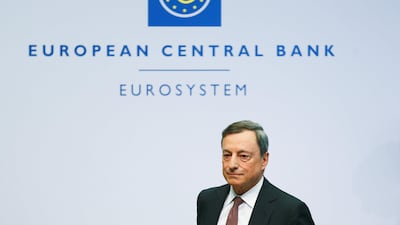Long term US and German Government bond yields have been declining since mid-May. However, at the end of June a number of Central Bankers surprised markets by releasing hawkish comments, leading to bond yields reversing sharply. Mario Draghi, president of the European Central Bank, spoke on June 27 at the European Central Bank Forum in Sintra, Portugal. The European Central Bank’s (ECB) asset purchase programme and interest rate policy were kept unchanged as Draghi commented “ … a very substantial degree of monetary accommodation is still needed for underlying inflation pressures to build up, and to support headline inflation in the medium term.” However, the ECB President also pointed out that, “the threat of deflation is gone and reflationary forces are at play”. Markets interpreted these comments as a sign of potential tapering. If inflation were to pickup, quantitative easing measures would be decreased.
Last Thursday Draghi also spoke at the ECB press conference giving a very balanced speech. The president did not add new details and avoided making comments which would possibly derail markets over the summer.
Janet Yellen, chair of the Federal Reserve (Fed), testified in front of the US House’s Committee on Financial Services on July 13. Yellen reflected a cautious path of monetary policy normalisation and made it clear this would be linked to growth. The chair stated that if the economy evolves as anticipated, the FOMC will begin to implement the Fed’s balance sheet normalisation plan this year. While Yellen also added that reflationary pressures are being slowed by temporary effects, it appeared clear that policy tightening will continue even if inflation remains subdued.
Latest US headline inflation came in softer than expectations. Both headline and core inflation have been declining for the past three months. While it’s key to keep monitoring inflation, Yellen said the Fed will not tie its actions to monetary policy prescriptions and rules in a “mechanical way”. If the forces weighing on inflation indeed prove to be “temporary” and the Fed is right, markets could be taken by surprise.
Central Bankers in developed markets seem to be speaking with a unison tone. The governor of the Bank of England (BOE), Mark Carney, has also recently released more hawkish comments. The Bank of Canada just raised its key lending rate for the first time in seven years.
The combined balance sheets of the Fed, ECB, BOE and Bank of Japan are over $14 trillion having more than doubled post the financial crisis. This expansion is now expected to start slowing. Shrinking central banks assets, along with potential rate hikes, will likely translate into higher bond yields globally.
Since Draghi’s speech at the end of June, 10-year German Bund yields moved rapidly from 0.37 per cent to 0.59 per cent on July 13 touching the highest level since January 2016. US 10 Treasury yields moved from 2.21 per cent to 2.39 per cent and are now back to 2.24 per cent, as of July 21). While the moves in German Bunds were significant for such a short time period, the moves in US Treasuries were far from those seen in the 2013 “Taper Tantrum” when Ben Bernanke’s comments caused US yields to rise 100 basis points in a few weeks. However, this year there has still been a fair amount of variability in US 10-year yields which started 2017 at 2.44 per cent, went to highs of 2.63 per cent and then touched lows of 2.13 per cent. As 10-year rates have moved lower since the beginning of the year and two-year rates have moved higher, the US yield curve has flattened.
Monetary policy has a significant role in determining the expected path of short-term interest rates which are in turn an important factor driving long-term rates. If the Fed starts reducing its balance sheet this year and hikes rates in December, we could see US long-term yields moving moderately higher. While the level of US yields is heavily influenced by European and Asian bond markets, as the European Central Bank begins to taper its asset purchases we would expect to see more pressure on the term premia in Europe, which remains in negative territory. As such, we are currently more cautious on European rates, and within a diversified portfolio would favour owning US duration as a defensive anchor against the threat of a risk-off event.
With expectations of higher rates and credit spreads having tightened significantly over the past year, one can imagine limited upside from capital gains in credit investments although these could still form a useful component of a properly diversified strategy.
Investors looking for opportunities will be turning to investments in relative value trades, emerging market debt, corporate and financial hybrids. On the latter, banks should in fact be among the beneficiaries of higher rates as yield curves steepen. On a relative basis, equities appear attractive especially as they will be supported by an extended economic cycle and steady global growth; although on an absolute basis they are far from cheap.
While there are risks to be mindful of, policy shifts and decreasing correlations are creating a multitude of opportunities within different asset classes and sectors.
Ilaria Calabresi is a vice president at JP Morgan Private Bank

